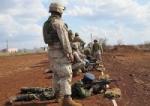The success of a free Iraq is critical to the security of the United States. A free Iraq will deny al-Qaida a safe haven. A free Iraq will counter the destructive ambitions of Iran. A free Iraq will marginalize extremists, unleash the talent of its people, and be an anchor of stability in the region. A free Iraq will set an example for people across the Middle East. A free Iraq will be our partner in the fight against terror and that will make us safer here at home.
(ed - I removed this paragraph to keep continuity in policy goals)
If we were to be driven out of Iraq, extremists of all strains would be emboldened. Al-Qaida could gain new recruits and new sanctuaries. Iran would benefit from the chaos and would be encouraged in its efforts to gain nuclear weapons and dominate the region. Extremists could control a key part of the global energy supply. Iraq could face a humanitarian nightmare. Democracy movements would be violently reversed. We would leave our children to face a far more dangerous world. And as we saw on September the 11th, 2001, those dangers can reach our cities and kill our people.
Whatever political party you belong to, whatever your position on Iraq, we should be able to agree that America has a vital interest in preventing chaos and providing hope in the Middle East. We should be able to agree that we must defeat al-Qaida, counter Iran, help the Afghan government, work for peace in the Holy Land, and strengthen our military so we can prevail in the struggle against terrorists and extremists.
So tonight I want to speak to members of the United States Congress: Let us come together on a policy of strength in the Middle East. I thank you for providing crucial funds and resources for our military. And I ask you to join me in supporting the recommendations General Petraeus has made and the troop levels he has asked for.
To the Iraqi people: You have voted for freedom, and now you are liberating your country from terrorists and death squads. You must demand that your leaders make the tough choices needed to achieve reconciliation. As you do, have confidence that America does not abandon our friends, and we will not abandon you.
To Iraq"s neighbors who seek peace: The violent extremists who target Iraq are also targeting you. The best way to secure your interests and protect your own people is to stand with the people of Iraq. That means using your economic and diplomatic leverage to strengthen the government in Baghdad. And it means the efforts by Iran and Syria to undermine that government must end.
To the international community: The success of a free Iraq matters to every civilized nation. We thank the 36 nations who have troops on the ground in Iraq and the many others who are helping that young democracy. We encourage all nations to help, by implementing the international compact to revitalize Iraq"s economy, by participating in the neighbors conferences to boost cooperation and overcome differences in the region, and by supporting the new and expanded mission of the United Nations in Iraq.










Bookmarks